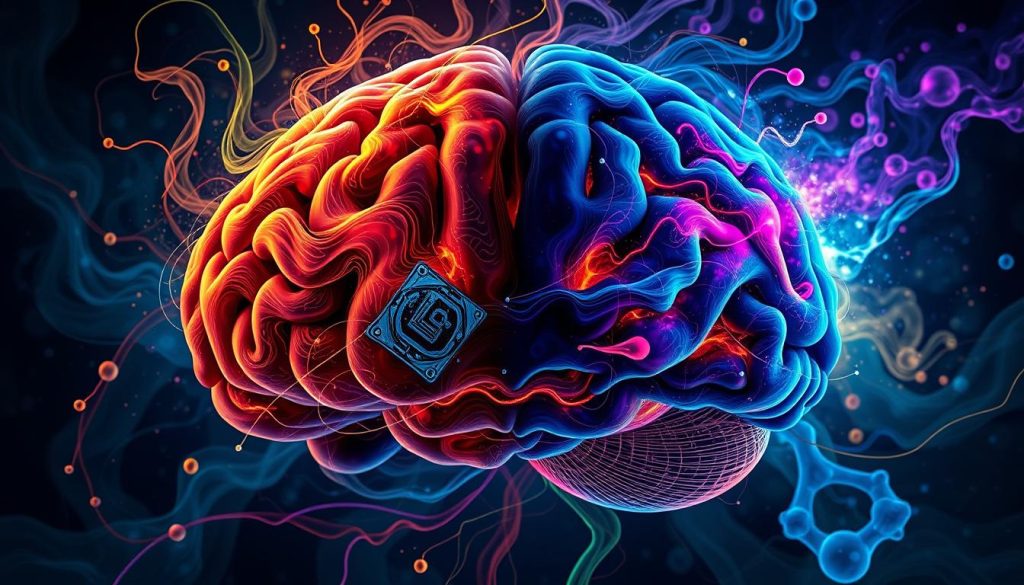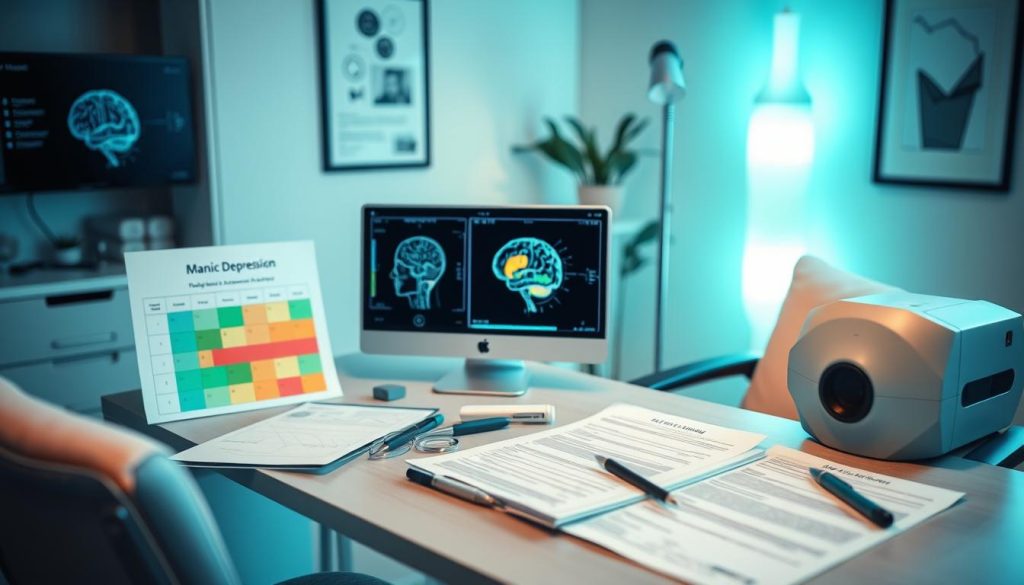The term manic depression, now more commonly referred to as bipolar disorder, captures a psychiatric condition that manifests through extreme mood dysregulation. People with this mental illness go through big mood swings. These swings affect their emotional state, energy, and ability to do daily tasks.
The mood swings can go from very high to very low. This makes everyday life very hard for those affected. By understanding the signs and symptoms, we can better support and manage this complex disorder.
This guide aims to clear up the often misunderstood aspects of manic depression. It’s all about creating a space of empathy and knowledge. For those dealing with this condition, knowing more can offer hope. It can guide them towards a more stable and healthy life.
Key Takeaways
- Manic depression, historically termed, is more widely known today as bipolar disorder.
- Sufferers experience a significant range of mood fluctuations affecting their emotional well-being and energy.
- Mood swings in manic depression render routine tasks and daily functioning profoundly challenging.
- Recognizing signs and symptoms plays a pivotal role in managing the psychiatric condition.
- Increasing understanding of manic depression is a step toward dispelling stigma and fostering support.
Understanding Manic Depression: An Overview
Manic depression, now known as bipolar disorder, has complex symptoms. It affects mood, energy, and daily life. It’s marked by high-energy mania and deep depression.
Grasping the full picture of this mood disorder is key to managing it well.
Definition of Manic Depression
The DSM-5 defines manic depression as a mix of mania and depression. These mood swings are extreme and disrupt daily life.
Historical Context
In the 19th century, French psychiatrist Jean-Pierre Falret coined “manic depression.” His work helped identify bipolar disorder as a unique mental health issue. This expanded our understanding of the condition.
Current Terminology
Today, we call it “bipolar disorder” to highlight its dual nature. This change also brought subcategories like bipolar I, II, and cyclothymic disorder. Each has its own mood swing pattern, making diagnosis and treatment more precise.
In short, knowing about manic depression helps clear up confusion. It supports those affected with more focused treatments.
Recognizing the Signs and Symptoms
It’s important to spot the signs of manic depression early. This condition shows through mood swings and changes in behavior. These changes can really affect how someone lives their daily life.
Primary Symptoms of Mania
The manic phase is known for high energy and feeling very happy. The Mayo Clinic says key signs include feeling overly confident and talking a lot. People might also sleep less and do things they wouldn’t normally do, which can be risky.
Primary Symptoms of Depression
The depression phase is the opposite, marked by sadness and hopelessness. The American Psychiatric Association says people might feel very tired, lose interest in things, and even think about suicide.
Changes in Behavior and Mood
Friends and family often see big changes first. Mood swings are a big sign, from being very happy or angry to feeling very sad. Spotting these changes can help get the right help and support.

The Stages of Manic Depression
Manic depression is a mental illness with extreme mood swings. It goes through different stages, each with its own symptoms. Knowing these stages helps in managing the condition better.
Hypomania
In the first stage, hypomania, people feel more energetic and happy. They might also feel irritable. These mood swings are not as bad as in full mania. Still, they can handle their work and personal life pretty well.
Mania
The mania stage has more severe symptoms than hypomania. People might do risky things and have strange thoughts. This stage can really hurt their social life and job.
Depression
After mania, people often feel very sad and tired. They lose interest in everything and feel hopeless. This stage is dangerous because they might harm themselves.
Each stage of manic depression is different. It shows how complex this illness is. Getting help early and tailored is key to managing mood swings and emotional instability.
Causes of Manic Depression
Understanding manic depression is key to tackling this complex psychiatric condition. Three main factors are at play: genetics, environmental stress, and brain chemistry.
Genetic Factors
Studies show that genetics play a big role in manic depression, also known as bipolar disorder. Many genes are involved, each adding a piece to the puzzle of this mental illness.
Environmental Influences
Life’s stressors can trigger manic depression in those at risk. Traumatic events and stressful environments can set off mood swings, especially in those already prone to it.
Neurochemical Imbalances
Research finds that brain chemistry imbalances affect mood, leading to manic and depressive phases. Neurotransmitters like serotonin, dopamine, and norepinephrine are often out of balance in these cases.
| Factor | Contribution to Manic Depression | Examples |
|---|---|---|
| Genetic | High heritability | Inherited traits from parents |
| Environmental | Trigger episodes | Stressful life events, trauma |
| Neurochemical | Mood regulation | Imbalances in serotonin, dopamine |

Risk Factors for Manic Depression
Manic depression, also known as bipolar disorder, can start and grow due to many factors. Knowing these can help spot and manage it early. We’ll look at three main risk factors: family history, substance abuse, and stressful life events. These all play a big part in mood swings and emotional ups and downs.
Family History
Genetics are key in who might get bipolar disorder. If a family member has it, your risk goes up. This shows why knowing your family’s health history is important.
Substance Abuse
Substance abuse doesn’t cause bipolar disorder but can make symptoms worse. Alcohol and drugs mess with brain chemicals, making mood swings more severe.
Stressful Life Events
Big life changes or stress can start bipolar disorder in those who are likely to get it. Losing a loved one, getting divorced, or losing a job can make emotional problems worse.
| Risk Factor | Details | Impact on Bipolar Disorder |
|---|---|---|
| Family History | Genetic predisposition to mood disorders | Increases susceptibility to bipolar disorder |
| Substance Abuse | Use of alcohol or drugs | Exacerbates symptoms, triggers mood episodes |
| Stressful Life Events | Significant changes or stress | Can trigger the onset of the disorder |
Diagnosis of Manic Depression
To figure out what is manic depression, doctors use a detailed method. They look at diagnostic criteria, psychological tests, and physical health checks. This way, they make sure other health issues aren’t causing the symptoms before diagnosing a mental illness.
Diagnostic Criteria
The main step in diagnosing manic depression is checking if it meets the DSM-5 criteria. A key sign is having at least one manic episode. This can be seen as feeling overly happy, being very active, or having too high self-esteem. The diagnosis might also include hypomanic and major depressive episodes, based on the person’s symptoms and history.
Psychological Evaluations
Psychological tests are a big part of diagnosing manic depression. Doctors do in-depth interviews and use questionnaires to look at mood history, behavior, and how severe the symptoms are. These tests help tell manic depression apart from other mental health issues that might look similar.
Physical Health Assessments
Physical exams are also very important, as shown by places like Johns Hopkins Medicine. These exams help rule out other health problems that could look like or make the mental health diagnosis harder. Tests like checking the thyroid and for toxins are common. These can affect mood and thinking.
| Evaluation Type | Purpose | Common Tools Used |
|---|---|---|
| Diagnostic Criteria | Confirm presence of specific symptoms as per DSM-5 | Checklist of manic and depressive episodes |
| Psychological Evaluation | Assess behavioral patterns and psychological history | Interviews, questionnaires |
| Physical Health Assessment | Rule out other medical conditions | Blood tests, physical exams |

Treatment Options for Manic Depression
Manic depression, also known as bipolar disorder, needs a mix of treatments. This includes medicine, talk therapy, and changes in lifestyle. Each person’s treatment plan is unique, aiming to improve their life quality.
Medication: Types and Uses
Mood stabilizers and atypical antipsychotics are key in treating bipolar disorder. They help control mood swings and other symptoms.
| Medication | Type | Common Use |
|---|---|---|
| Lithium | Mood Stabilizer | Reduces Manic Episodes |
| Valproate | Mood Stabilizer | Manages Mood Swings |
| Quetiapine | Atypical Antipsychotic | Treats Bipolar Depression |
Psychotherapy Approaches
Cognitive-behavioral therapy (CBT) and family-focused therapy are key in treating bipolar disorder. They help patients understand and manage their condition better.
- CBT: Changes harmful thought patterns.
- Family-focused therapy: Enhances family support and communication.
Lifestyle Modifications
Creating a routine, getting enough sleep, and reducing stress are important. A consistent daily routine helps stabilize mood. Adequate sleep and less stress are also key for well-being.
- Keep a regular sleep schedule.
- Try relaxation techniques like mindfulness and yoga.
Coping Strategies for Individuals
Living with manic depression can be tough. It often leads to mood swings and emotional ups and downs. But, there are ways to manage these challenges and live a more stable life. Here are some strategies to help you cope.
Building a Support System
Having a strong support system is key. Talk to your family, friends, and join support groups. They can help you feel less alone and share tips on managing manic depression.
Recognizing Early Signs
Spotting mood changes early is important. It helps you get help quickly. Knowing your patterns can also help you adjust your treatment plan and reduce episode severity. Learn more about managing manic depression here.
Self-Care Practices
Self-care is vital for mood stability. Make a routine that includes exercise, sleep, healthy food, and hobbies. These habits help you cope with mood swings and improve your well-being.
| Strategy | Benefits | Implementation |
|---|---|---|
| Support System | Reduces isolation, provides emotional support | Join support groups, maintain close contact with loved ones |
| Early Recognition | Precise adjustment of treatment, mitigates episode severity | Monitor mood changes, consult with healthcare providers |
| Self-Care | Enhances physical and mental health | Adopt healthy routines, engage in relaxing activities |

Living with Manic Depression
Living with manic depression means facing daily ups and downs in emotions and mood. It affects both personal and work life in big ways.
Daily Challenges
Manic depression makes days unpredictable. Mood and energy can change quickly. Even simple tasks feel hard and require a lot of effort.
Managing Work and Relationships
It’s tough to keep up with work and relationships when mood swings happen. But, with the right approach, it’s possible. Things like flexible work hours or open talks with friends and family can help a lot.
Coping Mechanisms
There are ways to live better with manic depression. Mindfulness, regular exercise, and therapy are key. They help manage mood swings and improve life quality.
| Coping Strategy | Description | Benefits |
|---|---|---|
| Mindfulness | Practices that anchor the individual in the present moment, reducing overthinking and anxiety. | Improves focus, reduces episodes of extreme mood spikes. |
| Regular Exercise | Physical activity that ranges from light jogging to structured gym routines. | Enhances mood stability through release of endorphins, decreases stress levels. |
| Ongoing Therapy | Regular sessions with a mental health professional to develop personal coping strategies and understand emotional patterns. | Provides emotional support and practical strategies to handle mood dysregulation. |
These strategies help manage manic depression’s effects. They give a sense of control and strength, even when it’s tough.
Impact on Families and Caregivers
Managing bipolar disorder changes family life a lot. It shows how important caregiver support and understanding family impact are. Caregivers are key to helping people with this condition stay well.
Understanding the Role of Family
Families support people with bipolar disorder a lot. They offer emotional, practical, and financial help. Keeping the family stable is key to handling mood swings.
Seeing signs of stress in the family can help start the right help. This keeps everyone’s well-being in check.
Support Resources for Caregivers
Caregivers need strong support to stay healthy while caring for others. Online forums, local groups, and healthcare advice are great help. Knowing about bipolar disorder helps caregivers tackle daily challenges better.
For more on the disease’s causes and early signs, check here.
Communication Strategies
Good communication is key in families to avoid misunderstandings. Talking openly about needs and worries helps everyone understand each other better. This makes managing bipolar disorder a team effort.
| Resource | Benefit | Focus Area |
|---|---|---|
| Online Support Groups | Peer advice and support | Emotional |
| Healthcare Providers | Professional care and treatment plans | Medical |
| Family Therapy | Improved communication | Relational |

Myth-Busting: Misconceptions About Manic Depression
It’s important to clear up myths about what is manic depression. This helps people understand better and reduces stigma. Misconceptions can hide the truth about bipolar disorder, leading to wrong opinions and not enough care for those who have it.
Common Myths
Many think mood swings in bipolar disorder are just quirks, not serious symptoms. This thinking can make people wait to get help and judge those with the disorder.
Facts vs. Fiction
Medical research shows the truth. It says bipolar disorder is caused by brain chemical imbalances, not just mood swings.
The Importance of Awareness
It’s key to spread the word about what is manic depression. When communities know, they can support better, help get early diagnosis, and push for full care. This awareness fights stigma and lets those affected get help without fear.
By fighting myths about manic depression, we can move closer to understanding. This makes our society more caring and informed.
Resources and Support Networks
For those with manic depression and their families, finding support is as important as medical care. This section aims to show key bipolar disorder resources and support networks. They offer a lifeline in managing a psychiatric condition.
National and Local Organizations
The Depression and Bipolar Support Alliance (DBSA) is a strong support network. It offers help both nationally and locally. They provide educational materials, support groups, and wellness tools.
These communities give people the strength to face daily challenges. They ensure no one has to go through their journey alone.
Online Resources
Online platforms are crucial in today’s world for bipolar disorder resources. They offer forums, webinars, and telehealth options. This makes support networks easily accessible, providing comfort and guidance instantly.
Finding Professional Help
Finding the right mental health professional is key to managing manic depression. The American Psychiatric Association has directories for finding psychiatrists and therapists. These resources make finding help easier, tailoring it to each person’s needs.
FAQ
Q: What are the signs and symptoms of manic depression?
A: Manic depression, or bipolar disorder, causes big mood swings. People might feel very high (mania or hypomania) or very low (depression). When they’re high, they might feel too good, think they’re special, and want to do a lot. When they’re low, they might feel sad all the time, lose interest in things, and have no energy.
Q: How was manic depression historically understood?
A: The term “manic depression” was first used in the 19th century. It covered many mood disorders with big mood swings. Over time, we learned more and now have a better way to understand and classify these conditions.
Q: Why is bipolar disorder the preferred term over manic depression today?
A: “Bipolar disorder” is now used because it’s more accurate. It shows we understand the condition better. The DSM-5 breaks it down into types like bipolar I, II, and cyclothymic disorder. This helps doctors and patients get the right treatment.
Q: What are the stages of manic depression?
A: Manic depression has different stages. Hypomania is a milder version of mania without losing touch with reality. Mania is more serious and can include risky behavior or hallucinations. Depression is the low point, marked by feeling worthless and hopeless for a long time.
Q: What causes manic depression?
A: Manic depression comes from a mix of genetics, environment, and brain chemistry. Family history and brain changes play big roles. Stress and life changes can also trigger it.
Q: Are certain individuals at higher risk for developing manic depression?
A: Yes, some people are more likely to get manic depression. Family history, substance abuse, and big life changes are risk factors.
Q: How is manic depression diagnosed?
A: Doctors diagnose manic depression by checking for specific signs in the DSM-5. They look at mood history and rule out other health issues. This helps them make an accurate diagnosis.
Q: What treatment options are available for manic depression?
A: Treatment includes medicines like mood stabilizers and therapy like cognitive-behavioral therapy. Lifestyle changes like regular routines and stress management are also important.
Q: How can individuals cope with manic depression?
A: Coping means having a strong support system and knowing when mood swings start. Self-care is key to managing symptoms and living well.
Q: What challenges do people living with manic depression face?
A: Living with manic depression is unpredictable. It’s hard to balance work and relationships. Finding ways to cope, like mindfulness and therapy, is crucial.
Q: How does manic depression impact families and caregivers?
A: Families and caregivers are vital in supporting those with manic depression. They need resources, open communication, and ways to cope together.
Q: What are common misconceptions about manic depression?
A: Many think manic depression is just a personality trait or something you can “snap out of.” It’s important to correct these myths to help people understand and seek help.
Q: Where can individuals, families, and caregivers find resources and support for manic depression?
A: Resources include the Depression and Bipolar Support Alliance (DBSA), online forums, and professional directories. These help those affected by manic depression find support and help.


















